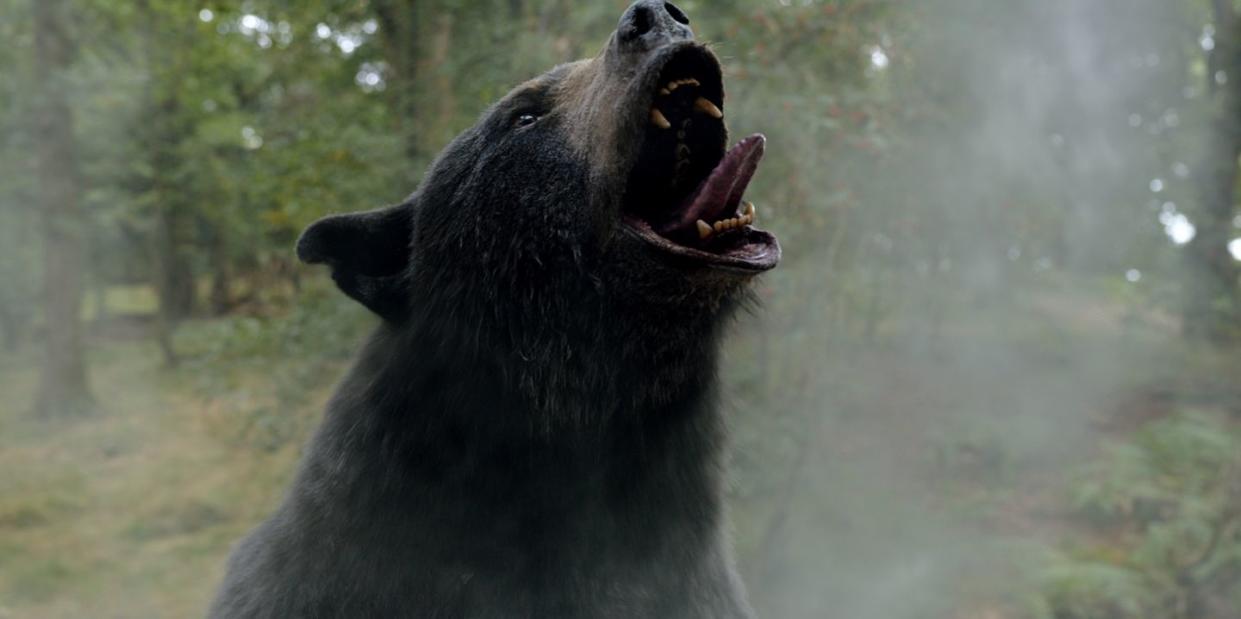The True Story of the “Cocaine Bear” Drug Smuggler Is Even More Outrageous than the Movie

- Oops!Something went wrong.Please try again later.
"Hearst Magazines and Yahoo may earn commission or revenue on some items through these links."
It was a quiet, partly cloudy morning when Andrew “Drew” Thornton II fell out of the sky and landed on a driveway in Knoxville, Tennessee, with $15 million worth of cocaine strapped to his body. Some time later, in Georgia, a black bear started chowing down on more than 70 pounds container of cocaine that had also fallen from Thornton’s airplane.
These real-life events from 1985 were the inspiration behind the Elizabeth Banks–directed action-comedy movie Cocaine Bear, which hits theaters today. That film takes its fair share of liberties with the truth. The bear, for example, simply died of an overdose in real life and did not go on a bloody, murderous rampage as in the film.
But the ill-fated flight of ex-narcotics-officer-turned-drug-smuggler Thornton, who tossed his stash overboard before leaping from the plane, was not only a true story, but also a more absurd one even by Cocaine Bear standards.
Banks told USA Today she was forced to omit aspects of Thornton’s life that were “too wild even for this movie.” Nevertheless, the character is so outrageous that when star Keri Russell first brought the script home, her husband and fellow actor Matthew Rhys read it and immediately said, “Text [Elizabeth] Banks and tell her I want to play that guy.”
What Happened During The Plane Crash?

Thornton had been smuggling drugs for years before his now-infamous 1985 flight. He had served six months in prison for allegedly piloting an airplane with a half-ton of marijuana aboard from South America to Kentucky in 1979 as part of a drug- and gun-importing and distribution ring.
The day of the 1985 jump, he was flying from Colombia on a Cessna 404 loaded with cocaine. After dropping 200 pounds of cocaine by parachute over Georgia, Thornton leapt from the aircraft over Tennessee and apparently became entangled in his own parachute. The 40-year-old died from the fall, and the plane, itself, later crashed into a mountain in western North Carolina.
It would take some time before authorities could piece together exactly what happened, but in its account of Thornton’s dramatic death, Time magazine noted that drug smugglers were increasingly resorting to desperate measures to evade radar technology from federal authorities.
“In some extreme cases, the crew members put the plane on automatic pilot, dump the drugs, and bail out,” Time’s John S. Demott wrote in 1985. “Once on the ground, they locate the contraband by tuning to the radio signals from the parachuted cargo. The plane crashes when it runs out of fuel.”
That’s not exactly how it goes down in Cocaine Bear, though. Screenwriter Jimmy Warden told USA Today that Banks opted to simply have Thornton get accidentally knocked out while departing from the plane. Warden said, “It’s quicker and more efficient to tell the story if the guy just hits his head and passes out. And also way funnier.”
Who Was Andrew Thornton?
Thornton’s upbringing wasn’t typical of a career criminal. Born in 1944, to a well-off family and raised on a thoroughbred farm in Bourbon County, Kentucky, he joined the U.S. Army and trained—somewhat ironically—as a paratrooper. Thornton earned a Purple Heart during U.S. intervention in the Dominican Civil War in 1965, according to The Washington Post.
After his time in the Army, Thornton became a police officer in Lexington, Kentucky, and joined—again, somewhat ironically—the narcotics squad in the 1970s, working on investigations with the local arm of the Drug Enforcement Administration, according to The Washington Post. He also attended law school at night and received a law degree in 1976, though he never practiced law.
Thornton loved adrenaline rushes and the thrill of danger, and he soon became bored with police work and became a drug smuggler. One DEA agent who previously worked with Thornton called him a “007 paramilitary type personality,” according to The Washington Post, while an FBI agent described him as “a little boy who never grew up.”
“He believed he was an ‘impeccable warrior,’” Betty Zairing, Thornton’s ex-wife, told The Washington Post in 1985. “He was a philosophical, incredibly disciplined, extremely spiritual, and loyal warrior, with his own code of ethics, who thrived on excitement.”
What Was Andrew Thornton’s Life Like?
Thornton was exceedingly eccentric and paranoid, and his short life was filled with stories as bizarre and colorful as that of his death. He regularly carried a gun, claimed to be a material arts master, bragged about killing a German shepherd with his bare hands, and described himself as an expert at skydiving from heights of below 2,000 feet, according to The Washington Post.
Thornton owned an isolated farm in Jessamine County, Kentucky, that he called Triad, which he surrounded with barbed wire, barracks, and trenches. Kentucky State Police repeatedly surveilled it in response to reports of guerilla warfare training for mercenaries, though Thornon denied any such activity.
While awaiting trial in 1982 on his criminal charges, Thornton was shot twice in the chest at close range while leaving a restaurant in Lexington. He was unharmed thanks to a bulletproof vest, and authorities later determined Thornton staged the shooting himself to fool the judge into believing his life would be in danger if he were imprisoned, according to The Washington Post.
How Thornton would have felt about his untimely death and less-than-flattering portrayal in Cocaine Bear is anybody’s guess. But there are some who feel it was the most appropriate way for him to go.
“I’m glad his parachute didn’t open,” Brian Leighton, an assistant U.S. attorney who once prosecuted Thornton, told The Los Angeles Times in 1985. “I hope he got a hell of a high out of that [cocaine].”

